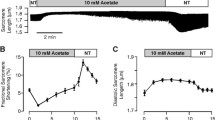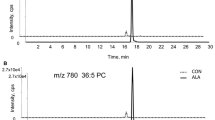Abstract.
Moderate alcohol consumption is related to a reduction in cardiovascular deaths. Lysophosphatidylcholine (LPC) produces arrhythmias similar to those induced by ischemia most likely due to its uncoupling properties. We assessed effects of LPC in the presence of ethanol in cardiac myocyte pairs using the double whole-cell voltage-clamp technique. Ethanol 11, 22 and 44 mmol·l–1 did not change junctional conductance for up to 25 min but postponed the time for total uncoupling induced by 20 µmol·l–1 LPC from 11.3±3.0 min (n=4), respectively, to 16.0±0.5 (n=3; P=0.05), 20.5±1.9 min (n=4; P<0.05) and 27.0±3.5 min (n=3; P=0.01; mean±SEM). LPC-induced uncoupling which might occur during ischemia may be counteracted by ethanol.
Similar content being viewed by others
Author information
Authors and Affiliations
Additional information
Electronic Publication
Rights and permissions
About this article
Cite this article
Daleau, P. Ethanol protects against lysophosphatidylcholine-induced uncoupling of cardiac cell pairs. Pflugers Arch - Eur J Physiol 445, 55–59 (2002). https://doi.org/10.1007/s00424-002-0896-8
Received:
Accepted:
Issue Date:
DOI: https://doi.org/10.1007/s00424-002-0896-8




